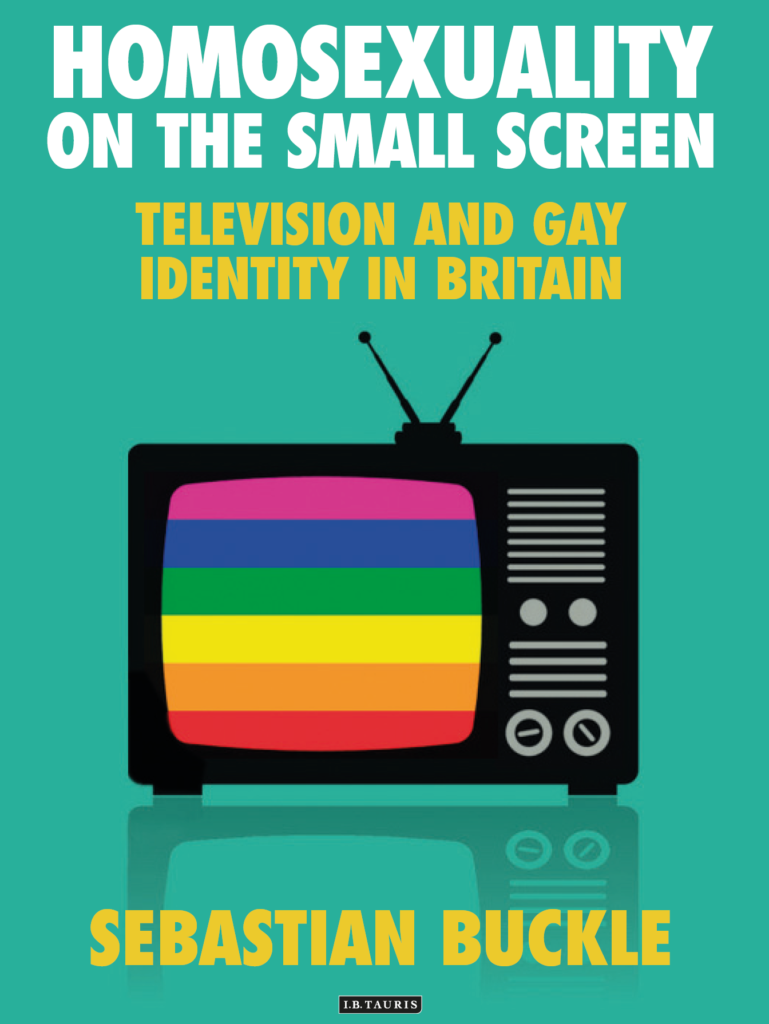Sebastian Buckle
Starting with the very earliest surviving drama featuring homosexuality in 1959, Homosexuality on the Small Screen explores television programmes from Britain in each decade up to the 2000s. It looks at homosexual themes, storylines, and characters, situating them historically, and relating them to the broader events in British history.

NOTCHES: In a few sentences, what is your book about? Why will people want to read your book?
Sebastian Buckle: My book examines the interactions between the medium and the reality of gay lives, showing how television mirrored the changes taking place in British society. It argues throughout that television was seminal in the construction of a gay identity – for both homosexual and heterosexual viewers – because its arrival coincided with a willingness to discuss sex and sexuality, as well as the emergence of the concept of sexual identity.
The book offers an in-depth examination of a sample of British television programmes which have not been examined before. For those interested in television, film, media, cultural studies, gender, sexuality, or creative media it will be invaluable in understanding the relationship between television and sexuality in Britain. This is an area currently lacking in any other research.
NOTCHES: What drew you to this topic, and what are the questions you still have?
SB: When I was researching my PhD, I wanted to understand how a public discourse around sexual identity was constructed. I recognised that television’s ubiquity inevitably played an important role, but I was surprised that not much historiography existed, beyond research on single television programmes. I wanted a bigger history, which covered the medium of television as well as the individual programmes, and that picked out the themes and changes over decades. As someone who loves watching television, I decided I would research and write it myself.
I made it clear at the start that this was a book about British television, but obviously British broadcasters import lots of programming from the USA, and it would be interesting to explore the contrasts between British and American programming on British television, and how, if at all, one influenced the other.
NOTCHES: This book is about the history of sex and sexuality, but what other themes does it speak to?
SB: The obvious answer to this question is television. I am really interested in the types of television programming that Britain was producing at any given moment. I find the 1970s and 1980s particularly fascinating, as so much was changing for gay people, with a counter-culture highlighting different visions for the future. Brave programming which does something different is interesting whether it talks about sexuality or something completely different. The book also touches on gender, ethnicity, politics, and the law. It includes short separate segments throughout which explain the history of the period, and the most important events affecting sexuality.
NOTCHES: How did you research the book? (What sources did you use, were there any especially exciting discoveries, or any particular challenges, etc.?)
SB: The first step was to actually watch the programmes that were being produced. I found these through a mixture of my own knowledge about British television, various historiographies, and the great Mediatheque collection at the BFI, which is free to watch. I then tried to find as much as I could that had been written about them, both at the time in newspaper articles and magazines, and then later in academic books. I finally sought out as much information that was available in the BBC Written Archives. Unfortunately not every programme had an archive of information about it, and it proved impossible to get hold of anything that was not on the BBC. I was really lucky to find some viewers’ reports at the BBC, which help paint a picture of some of the earliest shows.
NOTCHES: Whose stories or what topics were left out of your book and why? What would you include had you been able to?
SB: I would have loved to have looked at every single programme that included a recognisably gay character, but for reasons of time and the length of the study I decided to use examples only. In my introduction I also talk about excluding incidentally camp men or butch women because in those cases sexuality is only implied and not defined. I think it would be great to do a separate study of these sorts of characters, who have a lot to say about sexuality, but from a very different perspective. I’m not sure what has been written about British cinema either, which would be fascinating.
NOTCHES: Did the book shift significantly from the time you first conceptualized it?
SB: The main change was the number of programmes I decided to look at. Originally, I envisioned only five or six per decade, but it quickly became apparent that I needed at least eight or nine. As this was an extension of my previous work on the subject, but this time looking specifically at television, I had a good idea of what I wanted to achieve and so the overall concept did not change.
NOTCHES: How did you become interested in the history of sexuality?
SB: My interest goes back to researching a topic for my master’s dissertation. I was working full-time while doing the degree part-time and eventually came across the idea of looking at Section 28 after reading a book someone had given me as a birthday present. Part way through my research I was cycling home from work and fell off my bike; I fractured my arm in two places and couldn’t go to work for six weeks. In that time I got really into my research, and I credit it with giving me a real interest in history. If I’m honest, before that I just wanted a master’s degree! After that the PhD was the next natural step, which inevitably led to more questions that I wanted to explore, hence this book.
NOTCHES: How do you see your book being most effectively used in the classroom? What would you assign it with?
SB: This book is a natural progression to my last, so I see it being used it the same way on courses about sexuality in history, cultural studies, sociology and queer studies, and complements work by Jeffrey Weeks, George Chauncey, Matt Houlbrook, and Rebecca Jennings. With its focus on television, it obviously sits perfectly within media and cultural studies as well and complements work by Vito Russo and Stephen Tropiano who have both written about gay and lesbian identity in film and on television, albeit from an American prospective.
NOTCHES: Why does this history matter today?
SB: I am so grateful I now live in a world where information is so accessible. We’re not quite there with getting hold of old television, but it’s much better than it used to be. I remember growing up in a world where if you missed your favourite television programme you had to hope someone else had taped it for you or it was gone forever. It’s not like that anymore! There is so much queer content being created that it’s easy to think it’s always been this way. But it hasn’t. It’s also very easy to think that if you had questions about your sexuality you could just type them into Google. You couldn’t. That’s why the history of television’s role in the creation of sexual identity is so important. And also, it’s really interesting. Good TV doesn’t age, and even if it does, it’s an interesting historical artefact.
NOTCHES: Your book is published, what next?
SB: Another one! Who knows what it will be, but there will definitely be another one. The goal is an academic position, but there is nothing to stop me researching and writing queer history without one.
 Sebastian Buckle is a historian of homosexuality and sexual identity. His first book The Way Out: A History of Homosexuality in Modern Britain was published with I.B Tauris in 2015 and his second book Homosexuality on the Small Screen: Television and Gay Identity in Britain was published in 2018. He was awarded his PhD in 2013 from the University of Southampton, entitled ‘Homosexual Identity in England, 1967-2004: Political Reform, Media and Social Change’. Sebastian tweets from @sebbuckle
Sebastian Buckle is a historian of homosexuality and sexual identity. His first book The Way Out: A History of Homosexuality in Modern Britain was published with I.B Tauris in 2015 and his second book Homosexuality on the Small Screen: Television and Gay Identity in Britain was published in 2018. He was awarded his PhD in 2013 from the University of Southampton, entitled ‘Homosexual Identity in England, 1967-2004: Political Reform, Media and Social Change’. Sebastian tweets from @sebbuckle

NOTCHES: (re)marks on the history of sexuality is licensed under a Creative Commons Attribution-NonCommercial-NoDerivatives 4.0 International License.
Based on a work at www.notchesblog.com.
For permission to publish any NOTCHES post in whole or in part please contact the editors at NotchesBlog@gmail.com




